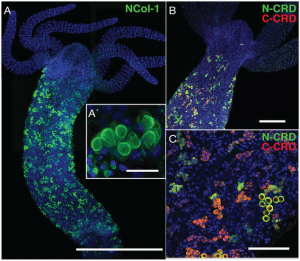Made by nature: a highly elastic pressurized balloon

Collagens constitute the dominant class of extracellular proteins in multicellular organisms. They are highly abundant wherever high elasticity is needed. The collagens of cnidarians, multicellular organisms among the oldest appearing on Earth and including jellyfish and sea anemones, are particularly fascinating. They structure the wall of the nematocyst, a balloon-shaped organelle, designed to naturally withstand pressures as high as 150 MPa. Until now it was not known how collagens contribute to define the properties of such a highly elastic pressurized balloon.
By employing a dual experimental and computational approach, researchers Prof. Frauke Gräter and Dr. Davide Mercadante from the Molecular Biomechanics group at HITS and researchers from the group of Dr. Suat Özbek at the Centre for Organismal Studies (COS) at Heidelberg University discovered how the short collagen fragments of cnidarians, also termed mini-collagens, assemble in a very peculiar way into highly functional and mechanically strong networks that constitute the organelle’s wall. The trick is to use two different types of ‘sticky’ domains at the two ends of the mini-collagen protein. The many cysteines in these terminal domains can establish crosslinks between molecules, just as in the rubber used for tires.
Although it was known that the sticky ends have different folds it was not known if these different structures would lead to different functions. The research team found one of these end domains to behave drastically different from the other. One of the terminal domains is a typical polymerizing unit that is only able to form linear polymers, whereas the other end domain is able to branch polymers as it can associate with at least two more units. Additionally, the branching end can polymerize much faster than its linearly polymerizing counterpart. These differences are thought to be vital for building a strong and elastic nematocyst ‘balloon’. These insights can be useful for designing new materials; as such sticky ends, which can be attached to any molecule. The outcomes of this project have been published in the April issue of Scientific Reports.
Publication: http://www.nature.com/articles/srep25709
Scientific Contacts:
Prof. Dr. Frauke Gräter
Group leader Molecular Biomechanics at HITS
frauke.graeter@h-its.org
Phone +49 6221 – 533 – 267
Dr. Davide Mercadante
PostDoc, Heidelberg University & HITS
Phone: +49 6221 – 533 – 254
[post-content shortcodes=”1″ id=”13196″]
About HITS
HITS, the Heidelberg Institute for Theoretical Studies, was established in 2010 by physicist and SAP co-founder Klaus Tschira (1940-2015) and the Klaus Tschira Foundation as a private, non-profit research institute. HITS conducts basic research in the natural, mathematical, and computer sciences. Major research directions include complex simulations across scales, making sense of data, and enabling science via computational research. Application areas range from molecular biology to astrophysics. An essential characteristic of the Institute is interdisciplinarity, implemented in numerous cross-group and cross-disciplinary projects. The base funding of HITS is provided by the Klaus Tschira Foundation.